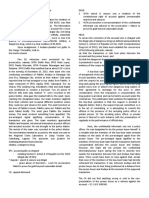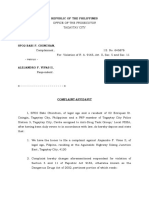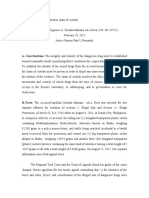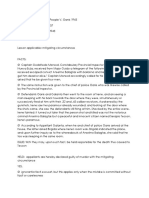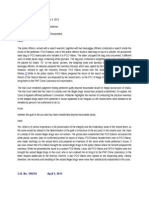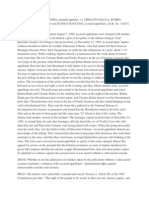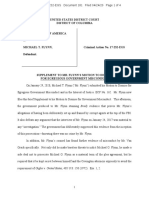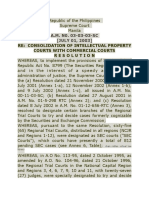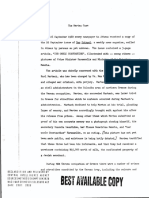People v. Alivio Case Digest
Uploaded by
Stef BernardoPeople v. Alivio Case Digest
Uploaded by
Stef BernardoPEOPLE v.
ARIELITO ALIVIO FACTS:
G.R. No. 177771
May 30, 2011
The prosecutions case relied on the theory that the police apprehended the appellants during a buy -bust operation conducted at Alivios residence. During the buy-bust operation, the police found drug paraphernalia at Alivios residence while a search on Dela Vegas person yielded one plastic sachet of shabu which the police seized. The prosecutions evidence showed that at around 9:30 p.m . of May 20, 2003, the Pasig City Police received a tip from an asset that one "Ariel" was rampantly selling illegal drugs in Bagong Ilog, Pasig City. A buy-bust team was immediately formed in coordination with the Philippine Drug Enforcement Agency. The buy-bust money, which consisted of two (2) 100 peso bills, was prepared and marked with the symbol, "3L." PO2 Lemuel Lagunay Laro was designated to act as the poseur-buyer. Together with SPO3 Lemuel Matias and PO1 Allan Mapula, PO2 Laro and the asset went to the house of Ariel. While the rest of the buy-bust team strategically positioned themselves at the target area, PO2 Laro and the asset met Ariel. The asset introduced PO2 Laro to Ariel who was later on identified as Alivio. The asset told Alivio that they wanted to buy shabu. Alivio asked how much they wanted to buy, to which the asset replied: "dalawang daan lang pre at saka puwede kaming gumamit dyan?" The two were ushered into the second floor of the house where they saw Dela Vega seated in front of a table with drug paraphernalia. PO2 Laro then gave the buy-bust money to Alivio who handed it to Dela Vega. The latter then took out from his pocket one plastic sachet of shabu which he gave to Alivio who handed it to PO2 Laro. After the exchange, PO2 Laro introduced himself as a police officer and arrested Alivio and Dela Vega. The asset made a signal for the buy-bust team to come inside the house. SPO3 Matias searched Dela Vega and found him in possession of one plastic sachet of shabu. The buy-bust team also retrieved the drug paraphernalia on top of the table, which paraphernalia they correspondingly marked. The buybust team took Alivio, Dela Vega and the confiscated items to the police station for investigation. Afterwards, the confiscated items were taken by PO1 Mapula to the PNP Crime Laboratory for examination. The two (2) plastic sachets tested positive for shabu. On February 28, 2005, the RTC convicted the appellants of all charges laid. The RTC relied on the presumption of regularity in the buy-bust operation and the lack of improper motive on the part of the police officers. The RTC rejected the proferred denial and frame-up as defenses as they are inherently easy to concoct, and found that the prosecution sufficiently established all the elements of the crimes charged and the identity of the appellants as perpetrators. The RTC thus concluded: WHEREFORE, premises considered, judgment is hereby rendered, as follows: In Criminal Case No. 12450-D both accused Arielito Alivio and Ernesto Dela Vega are hereby found GUILTY beyond reasonable doubt of the offense of Violation of Section 5, Article II, Republic Act 9165 (illegal sale of shabu) and are hereby sentenced to LIFE IMPRISONMENT and to solidarily pay a FINE of Five Hundred Thousand Pesos (PHP500,000.00).1avvphi1 In Criminal Case No. 12451-D accused Ernesto dela Vega is hereby found GUILTY beyond reasonable doubt of the offense of Violation of Section 11, Article II, Republic Act 9165 (illegal possession of shabu) and is hereby sentenced to Twelve (12) Years and One (1) Day to Twenty (20) Years and to pay a Fine of Three Hundred Thousand Pesos (PHP 300,000.00). In Criminal Case No. 12452-D accused Arielito Alivio is hereby found GUILTY beyond reasonable doubt of the offense of Violation of Section 12, Article II, of Republic Act 9165 (illegal possession of drug
paraphernalia) and is hereby sentenced to Six (6) Years and One (1) Day to Four (4) Years and a FINE of 8 Ten Thousand Pesos (PHP 10,000.00). The appellants appealed to the CA. On November 30, 2006, the CA affirmed the RTC decision. The CA took into account the consistent testimonies of the prosecution witnesses to support the presumption that the police officers regularly performed the buy-bust operation. The CA likewise ruled that the appellants failed to substantiate their defenses. ISSUE: Whether or not the CA erred in finding the appellants guilty beyond reasonable doubt for violation of RA 9165 asserting that the presumption of regularity cannot take precedence over the presumption of innocence in their favor. HELD: We find no reversible error committed by the RTC and the CA in convicting the appellants of the crimes charged. While the presumption of innocence is the highest in the hierarchy of presumptions, it remains a rebuttable presumption. In a criminal case, the presumption of innocence can be overcome by the presumption of regularity when the latter is accompanied by strong evidence supporting the guilt of the 10 accused. Even without the presumption of regularity, a drug conviction can be sustained through competent evidence establishing the existence of all the elements of the crimes charged. In this case, although the presumption of regularity did not arise considering the evident lapses the police committed in the prescribed procedures, we rule that the prosecutions evidence sufficiently established all the elements of the three (3) crimes charged and the identity of the appellants as the perpetrators. The existence of the buy-bust operation Prosecutions involving illegal drugs depend largely on the credibility of the police officers who conducted the buy-bust operation. Thus, we generally defer to the assessment on this point by the trial court as it had the opportunity to directly observe the witnesses, their demeanor, and their credibility on the 11 witness stand. Our independent examination of the records shows no compelling reason to depart from this rule. Familiarity What matters in drug related cases are not the existing familiarity between the seller and the buyer, but their agreement and the acts constituting the sale and delivery of the dangerous drug. Besides, drug pushers, especially small quantity or retail pushers, sell their prohibited wares to anyone who can pay for the same, be they strangers or not. It is of common knowledge that pushers, especially small-time dealers, peddle prohibited drugs in the open like any article of commerce. Drug pushers do no confine their nefarious trade to known customers and complete strangers are accommodated provided they have 22 the money to pay. [Citations omitted] In this case, the prosecutions evidence sufficiently established the exchange of the shabu and the buy bust money between the appellants and PO2 Laro.
The identity of the confiscated shabuand/or drug paraphernalia In ascertaining the identity of the illegal drugs and/or drug paraphernalia presented in court as the ones actually seized from the accused, the prosecution must show that: (a) the prescribed procedure under Section 21(1), Article II of R.A. No. 9165 has been complied with or falls within the saving clause provided in Section 21(a), Article II of the Implementing Rules and Regulations (IRR) of R.A. No. 9165; and (b) there was an unbroken link (not perfect link) in the chain of custody with respect to the confiscated items. In this case, although the prescribed procedure under Section 21(1), Article II of R.A. No. 9165 was not strictly complied with, we find that the integrity and the evidentiary value of the seized items were properly preserved by the buy-bust team under the chain of custody rule. Under the circumstances, the prosecutions evidence clearly established an unbroken link in the chain of custody, thus removing any doubt or suspicion that the shabu and drug paraphernalia had been altered, substituted or otherwise tampered with. The unbroken link in the chain of custody also precluded the 32 possibility that a person, not in the chain, ever gained possession of the seized evidence. The defenses of Denial and Frame-up The appellants merely denied the buy-bust sale and their possession of the shabu and the drug paraphernalia. They claimed that they were framed by the police who took their earnings and forcibly took them to the police station. In light of the positive and credible testimony and the concrete evidence showing the existence of the buy-bust operation, these defenses are unworthy of belief. Dela Vegas injuries alone cannot rebut the consistent evidence that the appellants were arrested pursuant to a buybust operation. We particularly note in this regard that the participating policemen denied that they previously knew the appellants and that they entertained ulterior or illicit motives to frame them. WHEREFORE, premises considered, we AFFIRM the decision, dated November 30, 2006, of the Court of Appeals in CA-G.R. CR-H.C. No. 01138 which, in turn, affirmed the decision, dated February 28, 2005, of the Regional Trial Court, Branch 70, Pasig City, in Criminal Case Nos. 12450-52-D. SO ORDERED.
You might also like
- Affidavit of Repudiation of Barangay Agreement100% (1)Affidavit of Repudiation of Barangay Agreement3 pages
- 575 PEOPLE VS. ALIVIO - G.R. NO. 177771 - MAY 30, 2011 FactsNo ratings yet575 PEOPLE VS. ALIVIO - G.R. NO. 177771 - MAY 30, 2011 Facts1 page
- People of The Philippines vs. Samin Zakaria, GR No. 181042, 26 November 2012 DigestNo ratings yetPeople of The Philippines vs. Samin Zakaria, GR No. 181042, 26 November 2012 Digest3 pages
- G.R. No. 199898 September 3, 2014 PEOPLE OF THE PHILIPPINES, Plaintiff-Appellee, LEO DELA TRINIDAD y OBALLES, Accused-AppellantNo ratings yetG.R. No. 199898 September 3, 2014 PEOPLE OF THE PHILIPPINES, Plaintiff-Appellee, LEO DELA TRINIDAD y OBALLES, Accused-Appellant1 page
- Sample of Affidavit of Arresting OfficersNo ratings yetSample of Affidavit of Arresting Officers2 pages
- 0 - F103-Group 2 Serious Physical InjuryNo ratings yet0 - F103-Group 2 Serious Physical Injury4 pages
- Quezon City Police District Office Holy Spirit Police Station (Ps 14)No ratings yetQuezon City Police District Office Holy Spirit Police Station (Ps 14)2 pages
- Object or Real Evidence: Xavier University - Ateneo de Cagayan College of LawNo ratings yetObject or Real Evidence: Xavier University - Ateneo de Cagayan College of Law25 pages
- People of The Philippines vs. Noel Bartolome - Abadano, Junnifer C.No ratings yetPeople of The Philippines vs. Noel Bartolome - Abadano, Junnifer C.1 page
- G.R. No. 89139 August 2, 1990 ROMEO POSADAS y ZAMORA, Petitioner, The Honorable Court of Appeals and The People of The PHILIPPINES, RespondentsNo ratings yetG.R. No. 89139 August 2, 1990 ROMEO POSADAS y ZAMORA, Petitioner, The Honorable Court of Appeals and The People of The PHILIPPINES, Respondents4 pages
- PEOPLE OF THE PHILIPPINES v. VICTOR DE JESUS Y GARCIANo ratings yetPEOPLE OF THE PHILIPPINES v. VICTOR DE JESUS Y GARCIA2 pages
- Drug Test Request and Laboratory Examination0% (1)Drug Test Request and Laboratory Examination2 pages
- People v. Mendoza, G.R. No. 191267 Case Digest (Criminal Procedure)No ratings yetPeople v. Mendoza, G.R. No. 191267 Case Digest (Criminal Procedure)5 pages
- People of The Philippines vs. Dolores Lorenzo, GR No. 110107, 26 January 1995 DigestNo ratings yetPeople of The Philippines vs. Dolores Lorenzo, GR No. 110107, 26 January 1995 Digest3 pages
- Facts:: THE PEOPLE OF THE PHILIPPINES, Appellee, vs. LOURDES V. LEGASPI, AppellantNo ratings yetFacts:: THE PEOPLE OF THE PHILIPPINES, Appellee, vs. LOURDES V. LEGASPI, Appellant1 page
- Facts:: THE PEOPLE OF THE PHILIPPINES, Appellee, vs. LOURDES V. LEGASPI, AppellantNo ratings yetFacts:: THE PEOPLE OF THE PHILIPPINES, Appellee, vs. LOURDES V. LEGASPI, Appellant1 page
- Just Compensation - Land Bank of The Philippines Vs ArceoNo ratings yetJust Compensation - Land Bank of The Philippines Vs Arceo2 pages
- Solar Team Entertainment Vs How Case Digest100% (1)Solar Team Entertainment Vs How Case Digest2 pages
- Re Conviction of Judge Adoracion G. Angeles For Child Abuse Case Digest100% (1)Re Conviction of Judge Adoracion G. Angeles For Child Abuse Case Digest2 pages
- De Zuzuarregui Vs Judge Rosete Case DigestNo ratings yetDe Zuzuarregui Vs Judge Rosete Case Digest2 pages
- People of The Philippines Michael Bokingo Alias "Michael Bokingco" and Reynante ColNo ratings yetPeople of The Philippines Michael Bokingo Alias "Michael Bokingco" and Reynante Col2 pages
- Judgement Sentencing Jamaat Politician To DeathNo ratings yetJudgement Sentencing Jamaat Politician To Death215 pages
- Lebin v. Mirasol G.R. No. 164255, September 7, 2011 Facts:: Appeals in Special Proceedings100% (3)Lebin v. Mirasol G.R. No. 164255, September 7, 2011 Facts:: Appeals in Special Proceedings2 pages
- Supplement To Mr. Flynn's Motion To Dismiss For Egregious Government Misconduct100% (5)Supplement To Mr. Flynn's Motion To Dismiss For Egregious Government Misconduct4 pages
- Higgins v. NH Department of Corrections, Commissioner Et Al - Document No. 16No ratings yetHiggins v. NH Department of Corrections, Commissioner Et Al - Document No. 164 pages
- Jamaica Times UK Newspaper December 2015No ratings yetJamaica Times UK Newspaper December 201524 pages
- National Prosecution Service: Complaint-AffidavitNo ratings yetNational Prosecution Service: Complaint-Affidavit4 pages
- United States v. Richard M. Penta, 475 F.2d 92, 1st Cir. (1973)No ratings yetUnited States v. Richard M. Penta, 475 F.2d 92, 1st Cir. (1973)7 pages
- Guidance On Unruly Passenger Prevention and Management 1st Edition100% (1)Guidance On Unruly Passenger Prevention and Management 1st Edition56 pages
- Property Prison In/Out Worksheet: Class D Offenses Class C Offenses Class B OffensesNo ratings yetProperty Prison In/Out Worksheet: Class D Offenses Class C Offenses Class B Offenses7 pages
- Eddie Tipton Lottery Charges Wisconsin - Dec. 22, 2016100% (1)Eddie Tipton Lottery Charges Wisconsin - Dec. 22, 201614 pages
- United States v. Patrick Wazny, 4th Cir. (2012)No ratings yetUnited States v. Patrick Wazny, 4th Cir. (2012)4 pages
- United States v. de La Torre, 599 F.3d 1198, 10th Cir. (2010)No ratings yetUnited States v. de La Torre, 599 F.3d 1198, 10th Cir. (2010)17 pages
- Court Case Bloggers Rights Darren ChakerNo ratings yetCourt Case Bloggers Rights Darren Chaker4 pages












